In 1992, as post-Cold War conflicts reshaped the nature of humanitarian action, a group of world leaders and experts in humanitarian response recognized the need for better-equipped humanitarian professionals. They established the Center of International Humanitarian Cooperation (CIHC) to train a new cadre of aid workers to perform in increasingly complex crises using the best techniques and technology available.
Through a multitude of multi-disciplinary academic courses in humanitarian action the CIHC offered lectures, case studies, seminars, practical exercises, and simulations in locations around the world.
In 2001, the CIHC developed the Institute of International Humanitarian Affairs (IIHA) at Fordham University to deepen the academic focus of its mission, and bridge the gap between academia and the practical work of humanitarian assistance. Throughout the past 20 years, 3,000 humanitarian workers from 140 countries have received this rigorous academic training.
The IIHA continues to evolve as modern-day crises, conflicts, and emergencies also persist and severely intensify. As we enter the 21st century, more people on earth endure conflict, natural disasters, and subsequent displacement than ever before. Simultaneously, the humanitarian system is overwhelmed with government funding for interventions failing to keep up to needs and humanitarian workers increasingly under threat.
Despite the challenges, we believe we need not be shocked into paralysis, but motivated to act. Collective and coordinated responses to humanitarian crises have never been more essential. Meeting multi-dimensional challenges of humanitarian action demands that good intentions be informed by practical experience, technical knowledge, and academic critique.
Grounded in social justice and humanitarian ethics, the Institute of International Humanitarian Affairs endeavors to make the global response to humanitarian crises dignified, effective, and sustainable.
Visiting Research Fellow – Physical and Mental Wellbeing of Mothers and Children in Adverse Circumstances
Visiting Research Fellow – Going from Fragmentation to Federalism
Visiting Research Fellow – Physical and Mental Wellbeing of Mothers and Children in Adverse Circumstances
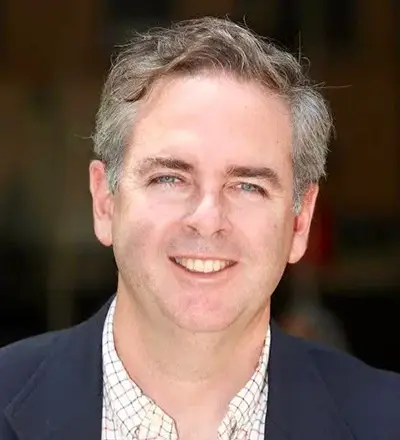
Executive Director
International Programs Officer
Brendan Cahill is the Executive Director of the Institute of InternationalHumanitarian Affairs (IIHA) at Fordham University and leads its outreach, academicprograms, research, and publications.
For over twenty-three years he has created, directed and taught in humanitarianprograms throughout the world, including South Africa, Jordan, Kenya, India, Egypt,Myanmar, Kuala Lumpur, South Korea, Nepal, Sudan, Colombia, Nicaragua,Ecuador, Spain, Ireland, Germany, Switzerland, England and the United States. Heestablished one of the first Masters programs in Humanitarian Action in the world,and, to date, has trained nearly 4,000 aid professionals from over 140 countries. He designed and implemented a full undergraduate Humanitarian Studies program atFordham University. He created a new Master of Science in Humanitarian Studiesprogram in New York, an online Master of Arts in International Humanitarian Actionand an undergraduate Minor in Community and Global Public Health. The Institute, which he helped create, acts as a bridge between the University andhumanitarian practice, and hosts lectures and symposia on a regular basis. Due to thework of the Institute, Fordham University is the US partner for NOHA, a consortiumof 12 European universities offering humanitarian education. Mr. Cahill has alsoserved on the editorial board of their academic journal.Mr. Cahill is the Publisher of The Refuge Press, an imprint of Fordham UniversityPress. He is currently co-authoring a textbook in Humanitarian Studies, to bepublished by University of Toronto Press. He is the Executive Producer ofHumanitarian Fault Lines, the Institute’s first podcast. His research includes theintersection of Design and the Humanitarian Sector, and Food Insecurity andConflict.
He received his BA from Colby College and his IDHA and MBA from FordhamUniversity.
Besides his work for the IIHA, he is the President of the CIHC, an independenthumanitarian NGO. He is a Trustee of The Helen Hamlyn Trust in London, aDirector of the KMC Foundation in New York, a member of the Advisory Board ofThe Humanitarian Centre of University College Dublin. He is the President of thePoint Lookout Historical Society and the Secretary of the Point Lookout CivicAssociation.
He is married with four children and lives in Point Lookout, New York.
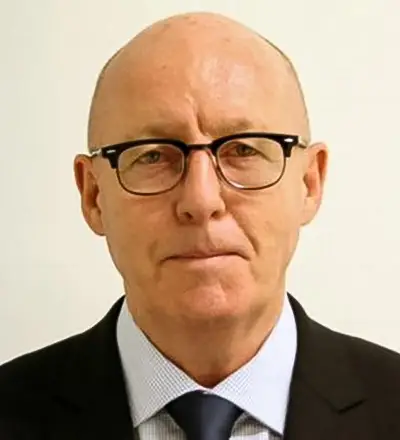
Distinguished Fellow and
Humanitarian Fault Lines Podcast Host
Mr. Jamie McGoldrick was the former Deputy Special Coordinator for the Middle East Peace Process, United Nations Resident Coordinator, and Humanitarian Coordinator for the Occupied Palestinian Territory. He joins the IIHA as the first Distinguished Fellow. Mr. McGoldrick brings extensive experience in humanitarian affairs, international cooperation, economic development, and political affairs. Since 2015, he has served as United Nations Resident Coordinator, Humanitarian Coordinator and United Nations Development Programme (UNDP) Resident Representative in Yemen.
He assumed that position after serving as the Resident and Humanitarian Coordinator, the UNDP Resident Representative in Nepal since 2013, and the Resident Coordinator and Resident Representative of UNDP in Georgia from 2009 to 2013. He was previously a senior manager with the United Nations Office for the Coordination of Humanitarian Affairs, notably as the Chief of the Humanitarian Reform Support Unit (2006-2009), and Section Chief of the Middle East, North Africa and Great Lakes Unit (2005-2006). He has also held positions with the International Red Cross movement and non-governmental organizations in a number of countries in Africa and as news producer and researcher with several television production companies in the United Kingdom and Europe. Mr. McGoldrick holds a master’s degree in political science and a bachelor’s degree in social sciences, and he has additional qualifications in disaster management, preventive diplomacy and mediation.
In my free time: I watch football/soccer, listen to jazz music and walk my dog
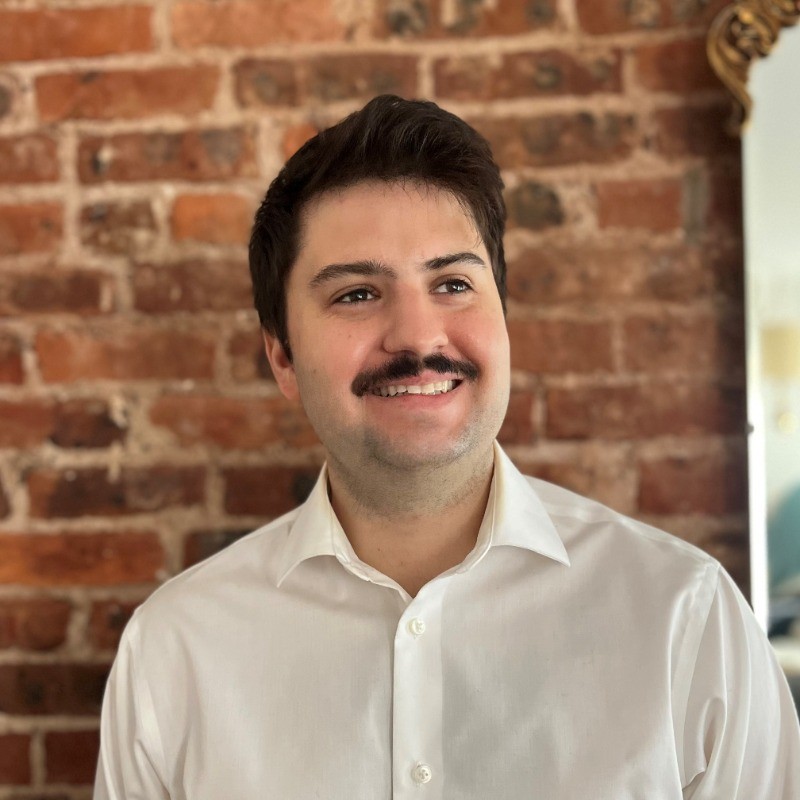
Humanitarian Fault Lines Executive Podcast Producer
Brooklyn, NY
Kris is a native of Phoenix, Arizona, now living in Brooklyn, New York. He attended college at Fordham University at the Rose Hill campus from 2011 – 2015.
Kris works as a financial advisor for a boutique firm, Eckman Wealth Management. He manages clients’ portfolios, crafts strategic plans, and assists in meeting desired financial goals.
Before working as an advisor, Kris spent several years in radio. He wore a variety of hats while working at WNYC, iHeartMedia, CBS Sports Radio, and ABC News Radio. The audio bug has stayed with Kris, and when not presenting cash flow charts to clients, he produces the Humanitarian Fault Lines podcast from Fordham University’s Institute of International Humanitarian Affairs.
In his spare time, Kris enjoys watching sports, golfing, and bar trivia. Since he’s from Phoenix, he roots for the Arizona professional teams, but at the college level, he’s a supporter of the Fordham Rams. The highlight of his bar trivia career (so far) is finishing second to Jeopardy! superstar Mattea Roach at Commonwealth trivia in Park Slope.
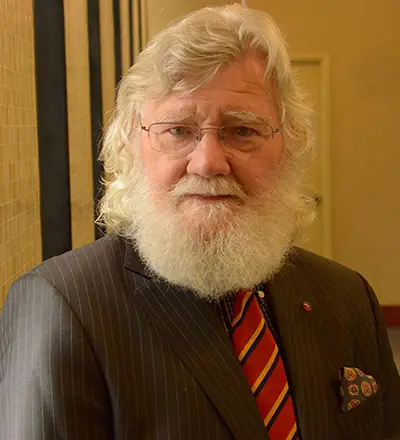
Humanitarian Programs Director
MHCE and IDHA Visiting Professor
UK
Larry Hollingworth is a Visiting Professor of Humanitarian Studies at the Institute of International Humanitarian Affairs (IIHA) at Fordham University in New York. Over the past decade, Mr. Hollingworth served as Humanitarian Coordinator on CIHC-supported missions for the United Nations in Iraq, Lebanon, East Timor, Palestine, and Pakistan.
After serving as a British Army officer for thirty years, Mr. Hollingworth joined the United Nations High Commissioner for Refugees (UNHCR) and held assignments in Sudan, Ethiopia and Eritrea. He was appointed UNHCR Chief of Operations in Sarajevo during the siege of the city in the Balkan conflict. Mr. Hollingworth has also worked with the United Nations World Food Programme (WFP), the International Committee of the Red Cross (ICRC), the United Nations Relief and Works Agency (UNRWA), and the United Nations Office for the Coordination of Humanitarian Affairs (OCHA). He was awarded Commander of the British Empire (CBE) in 2002 and honored by the U.S Department of State on the 60th Anniversary of the 1951 Convention Related to the Status of Refugees in 2011. Mr. Hollingworth is a frequent lecturer on relief and refugee topics in universities and is a commentator on humanitarian issues for the BBC. In his current role as Humanitarian Programs Director, which he has held for over 15 years, Mr. Hollingworth directs humanitarian training courses for participants from or intending to enter the humanitarian aid world. He has directed 48 one-month courses and more than 50 one-week courses, of which there are over 2,300 alumni.
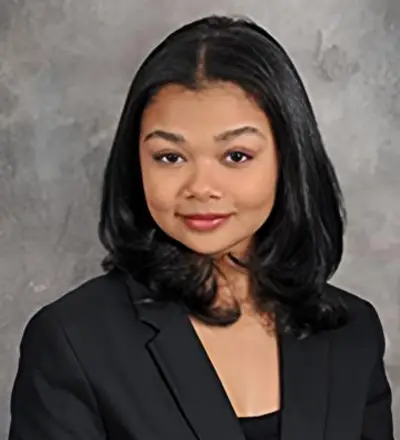
Program Officer
Bronx, New York
Is a recent graduate from Fordham University, holding a degree in Business Administration with a deep-seated passion for social innovation. During her academic tenure, Lucianny actively engaged in initiatives aimed at community development and sustainability. She has left her mark on global communities through her participation in Fordham’s Global Outreach projects, which included empowering youth in St.
Thomas and promoting sustainable agricultural practices in Mexico. She has honed her skills in the commercial banking sector with over two years at Chase Bank, where she excelled in customer service and financial management. Additionally, her role as a Business Development Intern at Paul Weiss Rifkind Wharton & Garrison LLP provided her with a solid foundation in legal business operations and strategic planning. At the Institute of International Humanitarian Affairs, Lucianny leverages her business acumen and passion for humanitarian work to coordinate programs that drive change and foster a more equitable world.
Academic Background: BS in Business Administration from Fordham University
With the IIHA since: 2024
In my free time I enjoy… Being in nature and spending time with friends and family
“At IIHA, the most rewarding aspects is working with a team dedicated to empowering students from diverse backgrounds to pursue humanitarian careers. Witnessing their shared hope for a better world inspires me every day.”
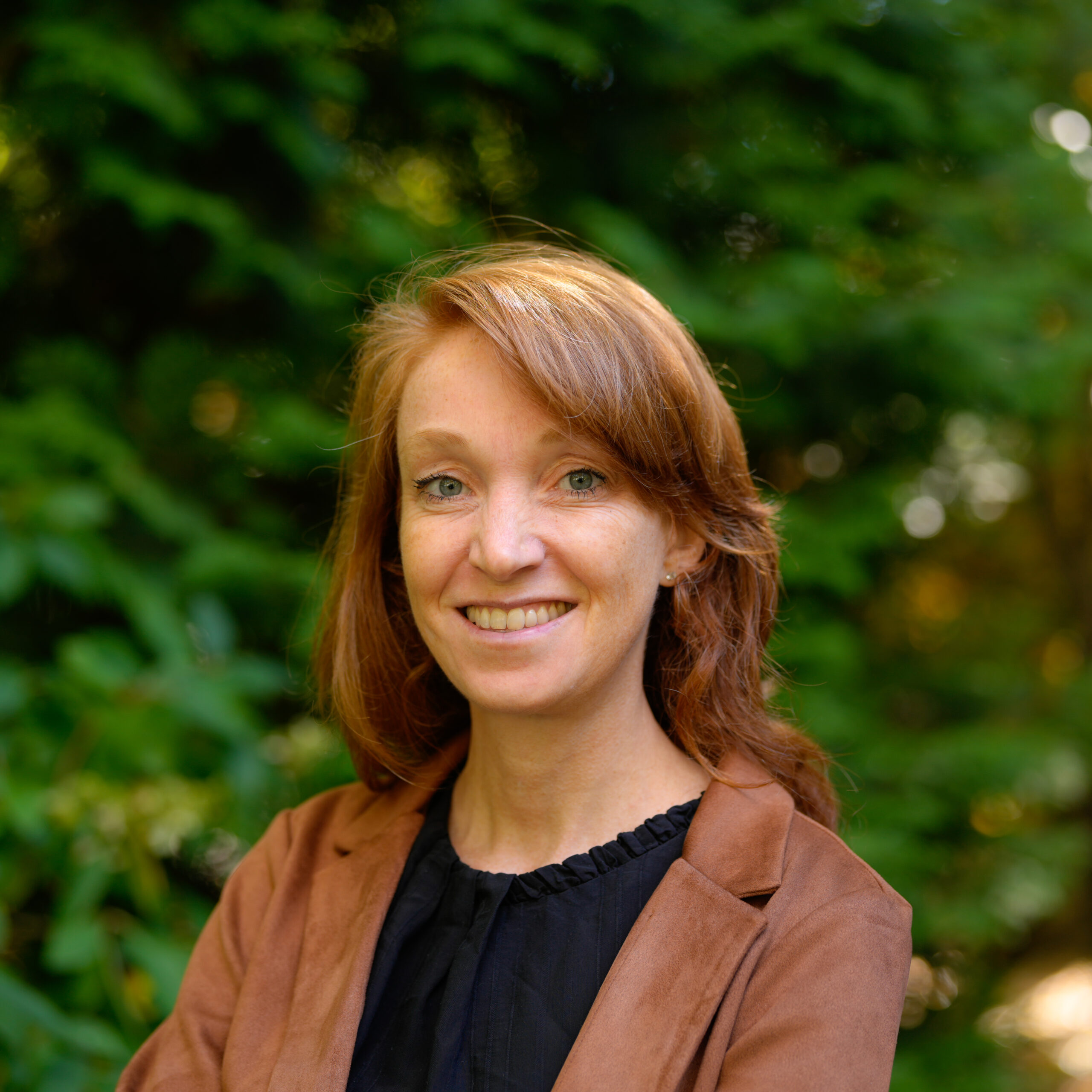
Helen Hamlyn Humanitarian Fellow and Global Program Director
Martine van der Does is a Dutch national and humanitarian expert with over 15 years of international experience. With a background in architecture she started her career working on humanitarian shelter at Delft University of Technology but soon moved to the field with Médécins sans Frontières (MSF) as a Construction Logistician. In 2010 Martine joined the Netherlands Foreign service where she worked in the Africa Department, Stabilisation and Humanitarian Aid Department and served as a Diplomat in Afghanistan and Jordan. In 2018 joined the International Committee of the Red Cross (ICRC) in Myanmar where she worked in remote areas on protection and water and habitat issues. Until recently Martine was the Regional Humanitarian Coordinator for the Netherlands Government in Amman, Jordan.
Martine is academically involved as a lecturer at Delft University in the Netherlands and Fordham University in New York. In the past years she also ran the prestigious International Diploma in Humanitarian Assistance (IDHA) as a Course Director in Geneva. Martine holds a Master of Science Degree in Architecture from Delft University of Technology and a Masters of Arts Degree in International Humanitarian Action from Fordham University. In her time off she is an active cyclist, runner, and enjoys ultraraces.
She has recently accepted a position as Helen Hamlyn Humanitarian Fellow at the IIHA.
Seriously considering the IDHA and want to learn more? Book an appointment with Martine on the left.
Master of Science in Architecture (MSc) and Master of Arts in International Humanitarian Action (MIHA) and IDHA 24
With the IIHA since: 2008
Current courses: IDHA and non-academic courses
In my free time I enjoy: Traveling, mountains, playing guitar and endurance sports such as long (distance) running, cycling, skiing and swimming.
“In a world you can be anything, be kind to yourself and the people you work for and with. ”
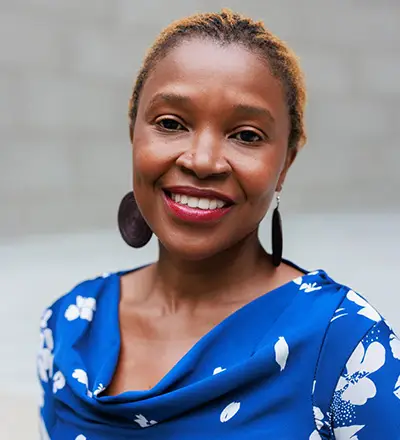
Helen Hamlyn Senior Fellow and Director of Graduate Studies
Bronx, New York
RUTH MUKWANA is a Helen Hamlyn Senior Fellow of the Institute of International Humanitarian Affairs (IIHA) at Fordham University. Most recently, she was an Adjunct Professor at Columbia University and Fiction Co-Editor for Solstice magazine.
For over twenty years, she worked with the United Nations including senior positions, Chief of Section, Asia & Pacific, Latin America and Caribbean with the Office for the Coordination of Humanitarian Affairs (OCHA), Chief of Duty of Care, Wellbeing and Capacity Development in the Executive Office in New York, and Deputy Head of Office for Sudan. She has worked with UNHCR, UNSCO and UNMISS in Sri Lanka, South Sudan, oPt, Tanzania and Switzerland. Her experience includes training, protection, internal displacement, voluntary repatriation, advocacy, access, and refugee status determination.
Ruth is also a fiction writer and a 2020 Center for Fiction/Susan Kamil NYC Emerging Fellow. Her work has appeared in several magazines including Bomb, Solstice, Consequence and the Black Warriors Review and she is currently working on a novel. She is the Creator and Host of the Stories and Humanitarian Action Podcast.
Ruth is a Ugandan national with a Law degree from Makerere University, a Masters in international and comparative Law from the Free University of Brussels and a Masters in Fine Arts from Bennington College. She lives in New York with her daughter.
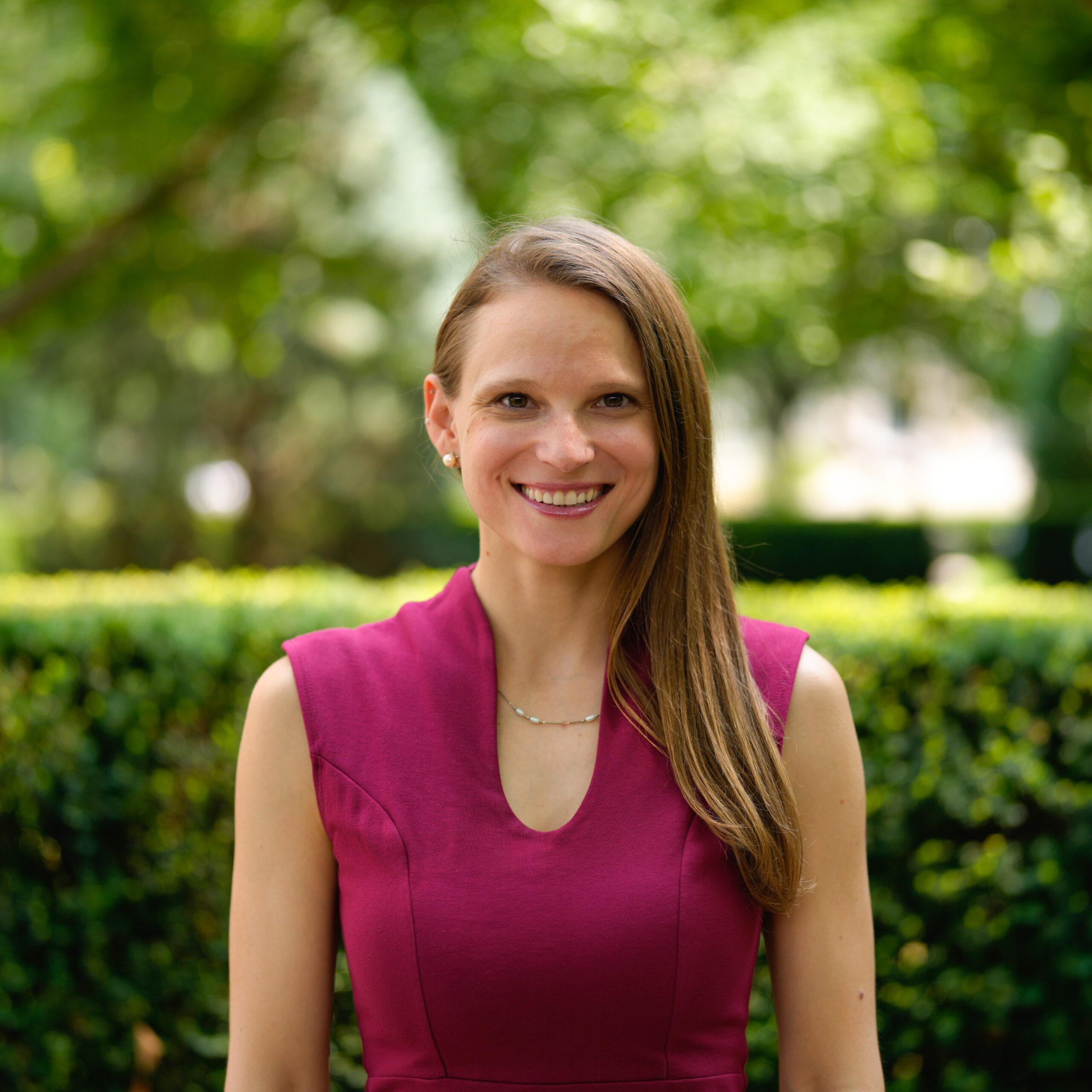
Communications Officer
Bronx, New York
Summer Lily (“Lily”) is the Communications Officer at the Institute of International Humanitarian Affairs (IIHA), where she works directly for the IIHA Executive Director, developing and implementing the communications and marketing strategy to fulfill the Institute’s overall mission and vision. Lily joins us from Connecticut; however, she brings us four years of international experience in humanitarian work. After graduating with a BA in Communication, Lily accepted a position as an AmeriCorps volunteer in Oregon, where she coordinated after-school education programs. Summer Lily then served as an English Teacher in Catalonia.
Following this experience, Lily joined the Peace Corps in Cambodia, where she trained teachers in the most up-to-date English instruction practices and taught English classes to 1st -6th grade. Upon her return from Cambodia, Lily entered the hospitality field as the Sales and Marketing Manager at a historic inn and wedding venue while undergoing a master’s program in Strategic Communication at American University. Throughout the years, Summer Lily served on the Connecticut Commission on Community Service to contribute her perspective as a returned volunteer and knowledge in communications.
Publications: Deceptive Food Labeling and Advertising
Academic Background: BA Communication, Eastern Connecticut State University 2015, MA Strategic Communications, American University 2023
With the IIHA since: November 2023
In my free time I…enjoy exploring the city, practicing Spanish and Khmer, spending time with my loved ones, kickboxing, and running and hiking.
“Everyone can be a volunteer. Everyone can be a humanitarian. We give you the tools, knowledge, and training to enter the field confidently and prepared.”
PhD graduated from Brunel University in 1971 with the degree of Bachelor of Technology with Honours in Polymer Science and Technology and was awarded the degree of Master of Technology, also from Brunel University, in 1972 for research into high temperature resistant polymeric materials. Between 1972 and 1985, he worked with various NGOs in South Asia. From 1979 to 1985 he was employed by Tearfund and seconded to HEED in Bangladesh and to ACROSS in Southern Sudan, as Field Director. In 1985, Dr. Land joined UNHCR and worked with them in Pakistan, Indonesia, Malawi, Croatia, Bosnia and Herzegovina, Kosovo, Russian Federation, Geneva and Brussels, in operational field roles and in donor relations, until his retirement in 2006.
Since leaving UNHCR, Dr. Land has undertaken various consultancies and taught on courses in humanitarian subjects at Fordham University (New York) as well as Liverpool School of Tropical Medicine, Manchester University, University of Copenhagen and the University of Medical Science and Technology in Khartoum. In 2014, he was admitted into the degree of Doctor of Philosophy at University of Liverpool. His thesis is titled “Towards enhancing responsibility and accountability in humanitarian action: Understanding the subjective factors that influence evaluation of humanitarian actions and the implementation of the recommendations made.” Having served as the Senior Tutor for the Center for International Humanitarian Cooperation (CIHC) from 2008 to 2014, Dr. Land now holds a Senior Fellowship and is an Adjunct Professor at the Institute of International Humanitarian Affairs (IIHA) at Fordham University in New York.
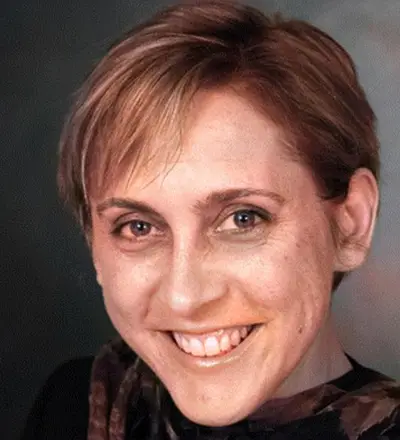
Humanitarian Advocacy Professor
Fundamentals of Humanitarian Action
Washington D.C.
Anne is a proven, passionate advocate with and on behalf of civilians in conflict zones globally and with individuals in mental health or substance use recovery in the US. Starting in 1995, she worked for more than a decade in the Great Lakes region of Africa with non-governmental organizations and the United Nations Office for the Coordination of Humanitarian Affairs.
She has contributed to analysis and advocacy on the impacts of conflict on civilians and vulnerable individuals, including UNICEF’s 10-year review of The Impact of War on Children Graça Machel Report. She testified before US Senate and House committees on the humanitarian crisis in the DRCongo, including the use of child soldiers, and on sexual violence as a war crime, and has worked in and written about Rwanda, Tanzania, Chad, Haiti, Kenya, Burundi, and the former Yugoslavia.
Anne worked for numerous non-governmental organizations, including Oxfam UK, ChildFund International, Refugees International, the International Rescue Committee and Mental Health America of Virginia. She has created and taught courses on humanitarian issues at Fordham University’s Institute for International Humanitarian Affairs, the College of William and Mary and the University of Richmond.
She received a BA in international relations from the College of William and Mary and an MSc in international policy from the University of Bristol in the UK. She currently lives in the DC area.
Bernard Wiseman is a former Head of Mission with Médecins Sans Frontières/Doctors without Borders and has been working in international humanitarian response for 10 years. Bernard began his international career working with the United States Peace Corps, where he served in Senegal, West Africa as an environmental education extension agent in small rural communities. Bernard has worked with MSF since 2015 as a logistics manager, Coordinator, and most recently Head of Mission. He has served communities in the Central African Republic, Democratic Republic of Congo, South Sudan, Papua New Guinea, Bangladesh, and Myanmar. Bernard most recently returned from Kharkiv, Ukraine in 2022 where his MSF teams worked with thousands of displaced populations across the country.
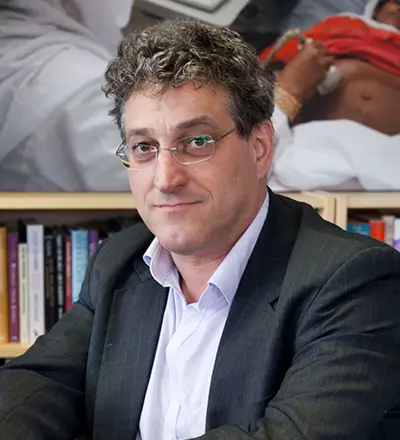
Research Fellow
Willem van de Put is a cultural/medical anthropologist and philosopher by training. He worked in international public health since 1989, first with Médecines sans Frontières Holland, where he introduced medical anthropology and mental health programming, later as the founder of TPO Cambodia (1993-1998) and general director of HealthNet TPO (1998-2016). Together with Lynne Jones and the unfailing support of the IIHA at Fordham University, Willem started the course Mental Health in Complex Emergencies in 2004. Willem recently retired as a research fellow with the Institute of Tropical Medicine in Antwerp. He is currently affiliated as research fellow with Fordham University, with a focus on emergency programming and health systems development in fragile states. Willem has also co-founded ‘C4C’, a foundation working on ‘Culture for Change’, applying experience in action research in concrete programmes where cultural traits and beliefs are transformed from perceived barriers for effective healing to drivers of sustainable change.
Ku, GMV., Van De Put, W., Katsuva, D., Ahmed, MAA. & Meessen, B. (2023) A framework for quality of care for chronic conditions: results of a scoping review. In: Tropical Medicine and International Health. 28, S1, blz. 254-255 2 blz.
van de Put, W. & van Mierlo, B., (2023) CONSTRUCTING NEW MEANING TO MOVE ON: APPLYING A BODY-ORIENTED APPROACH TO ADDRESS (COLLECTIVE) TRAUMA In: Tropical Medicine and International Health. 28, S1, blz. 265-266 2 blz., 306.
Mohamed Ali AG Ahmed, Birama Apho Ly, Djeneba Diarra, Fatoumata Bintou Traore, Niélé Hawa Diarra, Mohamed Toure, Mahamadou Dembele, Willem van de Put, Marie-Pierre Gagnon, Seydou Doumbia (2023) Les personnes déplacées internes au Mali face à la COVID-19 : une étude qualitative. Dans Santé Publique 2023/3 (Vol. 35), pages 343 à 351
Millimouno TM, Meessen B, Put WVD, et al (2023) How has Guinea learnt from the response to outbreaks? A learning health system analysis BMJ Global Health 2023;8:e010996.
Chhim, Srean & van de Put, Willem et al (2023) COVID-19 in Cambodia, January 2020–June 2022: a success story. 10.1101/2022.12.24.22283920.
Chhim, S., Ku, G., Mao, S., Van De Put, W., Van Damme, W., Ir, P., Chhea, C. & Or, V : Descriptive assessment of COVID-19 responses and lessons learnt in Cambodia, January 2020 to June 2022., In: BMJ Global Health, 2023.
Kouyate M, Barry L, Sow A, & De Put WV, (2022) Improving access to and use of maternal health services during COVID-19: Experience from a health system strengthening project in Guinea.Front. Public Health 10:1004134.. doi: 10.3389/fpubh.2022.1004134
Eisenbruch, M, Chhun, P, Chou, S and van de Put, W. (2021) Toward a cultural template of infectious disease and pandemics: Ethnographic insights into COVID-19 in Cambodia. American Anthropological Association Meeting, Baltimore, 17-21 November.
Mukala Mayoyo, Erick, Willem van de Put, Sara Van Belle, Bibiane van Mierlo, Bart Criel (2021) Intégration de la santé mentale dans les services de soins de santé primaires en République démocratique du Congo. Santé Publique 2021/1 (Vol. 33) https://www.cairn.info/publications-de-Willem-van%20de%20Put–723358.htm?WT.tsrc=cairnPdf
Eisenbruch, M, Chhun, P, Chou, S. and van de Put, W. (2021). How Should Child Psychiatrists be Culturally Responsive to Child Sexual Abuse (CSA) Including Unwanted Sexual Touching? an Ethnographic Study in Cambodia. [39989]. 68th Annual Meeting, American Academy of Child & Adolescent Psychiatry. 18-30 October. Journal of the American Academy of Child and Adolescent Psychiatry. Supp. (forthcoming).
Kolie, D., R Van De Pas, & van de Put, W. (2021) et al, Retention of healthcare workers 1 year after recruitment and deployment in rural settings: an experience post-Ebola in five health districts in Guinea. Human Resources for Health 19 (1), 1-18
Kolie, D., Van De Pas, R., Fofana, T. O., Delamou, A., Put, W. V. D. & Van Damme, W. (2021) Guinea’s response to syndemic hotspots. In : BMJ Global Health . 6, 10
Van Mierlo, B., Nagel, N. & W. van de Put (2021) Inspiring Life in Frozen Communities: Supporting Migrant Women in Brussels to Regain Control over their Lives. Community Mental Health Journal, 57(3), 598-605 DOI 10.1007/s10597-020-00743-z
Kolie, D, W. van de Put et. al. (2020) Retention of Healthcare Workers One Year After Recruitment and Deployment in Rural Setting: an Experience Post-Ebola in Five Health Districts in Guinea. DOI 10.21203/rs.3.rs-122033/v1
Ag Ahmed, M. A., Ly, B. A., Millimouno, T. M., Alami, H., Faye, C. L., Boukary, S., Accoe, K., Van Damme, Willem Van De Put , Criel, B. & Doumbia, S., (2020) Willingness to comply with physical distancing measures against COVID-19 in four African countries. Sep-2020, In : BMJ Global Health . 5, 9
Delphin Kolie, Alexandre Delamou, Remco van de Pas, Nafissatou Dioubate, Patrice Bouedouno, Abdoul Habib Beavogui, Abdoulaye Kaba, Abdoulaye Misside Diallo, Willem Van De Put, Wim Van Damme (2019) ‘Never let a crisis go to waste’: post- Ebola agenda- setting for health system strengthening in Guinea. BMJ Global Health 2019;4:e001925. doi:10.1136/ bmjgh-2019-001925
Remco van de Pas, Willem van de Put and others (2019). Primary health care and health emergencies. Part of the Technical series on primary health care on the occasion of the Global Conference on Primary Health Care, Astana, Kazakhstan. October 2018. World Health Organization. (2018). Primary health care and health emergencies. World Health Organization. https://apps.who.int/iris/handle/10665/328105. License: CC BY-NC-SA DOI: 10.13140/RG.2.2.16223.20640
Remco van de Pas, Willem van de Put, Clara Affun-Adegbulu and Button Ricarte (2018). Primary health care and health emergencies. An AA40 background paper for the Alma Ata 40 Years Global Conference on Primary Health Care, Astana, Kazachstan, 25-26 October 2018. WHO, Unicef, Ministry of Health Care, Republic of Kazakhstan. December 2018. DOI: 10.13140/RG.2.2.20762.29125
Van Damme Wim, Willem van de Put , Devadasan Narayanan, Ricarte Juan Antonio, Muyembe Jean-Jacques (2018). Is the world ready for the next pandemic threat? BMJ 2018; 362 :k3296
Clara Affun-Adegbulu, Sara Van Belle, Wim van Damme, Button Ricarte, Remco van de Pas and Willem van de Put (2017) Context and Crisis. Evidence on Coordination and Health Systems Strengthening (HSS) in Countries under Stress: a literature review and some reflections on the findings. Institute for Tropical Medicine, Antwerp
Maurice Eisenbruch, Willem van de Put and Kim Savuon (2016) Violence in Cambodia – Equipping psychiatry to fit the culture. Paper for 15th ASEAN Federation of Psychiatry and Mental Health Congress 25-27 August 2016, Semarang, Indonesia
Ventevogel , P., W. van de Put, H. Faiz, B. van Mierlo, M. Siddiqi, I. Komproe. (2012) Improving access to mental health care and psychosocial support within a fragile context: a case study from Afghanistan. PLoS Medicine (http://www.plosmedicine.org/article/info%3Adoi%2F10.1371%2Fjournal.pmed.1001225)
Van de Put, W. (2008). Communication and Social Engineering: Addressing Terrorism and Social Suffering. In: Psychosocial Stress in Immigrants and in Members of Minority Groups as a Factor of Terrorist Behavior (pp. 155-167). IOS Press.
Somasundaram D. J., Van de Put, W. (2006) Management of Trauma in Special Populations After a Disaster. J Clin Psychiatry 2006;67[suppl 2]:64–73
Eisenbruch, I.M., Joop T. V. M. de Jong, Willem van de Put. (2004). Bringing Order Out of Chaos: A Culturally Competent Approach to Managing the Problems of Refugees and Victims of Organized Violence. Journal of Traumatic Stress, Vol. 17, No. 2, April 2004, pp. 123–131
van de Put, W. A. C. M., & Eisenbruch, M. (2004). Internally Displaced Cambodians: Healing Trauma in Communities. In K. E. Miller & L. M. Rasco (Eds.), The mental health of refugees: Ecological approaches to healing and adaptation (pp. 133-159). Mahwah, NJ, US: Lawrence Erlbaum Associates Publishers.
Van de Put, W (2002), Addressing mental health in Afghanistan. THE LANCET Vol 360, pp 40-43.
Van de Put, W. & Eisenbruch, M. (2002). The Cambodian Experience. In: Trauma, War, and Violence: Public Mental Health In Socio-cultural Context. Edited by J. de Jong, Plenum Kluwer, New York
De Jong J. T.V.M., W. van de Put, D. Somasundaram a.o. (2001) Lifetime Events and Posttraumatic Stress Disorder in Four Post-Conflict Settings. Journal of the American Medical Association (JAMA), 286 (5) 555-562.
Van de Put, W.A.C.M. & Van der Veer, G. (2001) Counseling in Cambodia. In: Mind & human interaction, 11 (4) 246-257. Center for the Study of Mind and Human Interaction, University of Virginia.
Somasundaram, D. J., Van de Put, W.A.C.M., Eisenbruch I. M, J. de Jong (1999) Starting Mental Health Services in Cambodia. In: Social Science and Medicine, 48 1029-1046
Somasundaram D. J., Van de Put, W. (1999): Mental Health Care in Cambodia. In: Bulletin WHO Forum, 77 (3).
Van de Put, W. (1992): Empty Hospitals, Thriving Business: utilization of health services and health seeking behaviour in two Cambodian districts. Medicines sans Frontières report, Phnom Penh, Cambodia.
I am a medical anthropologist and philosopher, trained at the University of Amsterdam. I am Senior Research Fellow at the International Health Unit, Institute for Tropical Medicine in Belgium, Research Fellow at the Institute of International Humanitarian Affairs, Fordham University in the United States, and founding director of Culture4Change (C4C), an international NGO in the Netherlands. I was Director of HealthNet TPO (1998-2016) and founding Director of Transcultural Psychosocial Organization (TPO) Cambodia (1994-98). I also have experience in some 20 other countries, including Afghanistan, Burundi, DR Congo, Nicaragua, Rwanda, Sudan and Myanmar. I collaborate closely with the National Institutes of Public Health in Cambodia, Guinea and Mozambique.
"Each instructor brings international experience to the classroom. I am a cultural/medical anthropologist and philosopher by training. I’ve previously worked at Amnesty International and since 1989 in international public health, first with Médecins Sans Frontières Netherlands, where he introduced medical anthropology and mental health programming. In 1994, I founded TPO Cambodia (1994-1998) and was general director of HealthNet TPO (1998- 2017). Currently, I work as a research fellow at the Institute for Tropical Medicine in Antwerp and Fordham University in New York. I am also the co-founder of 'Culture for Change', a foundation that uses cultural habits and beliefs as drivers of 'positive change"
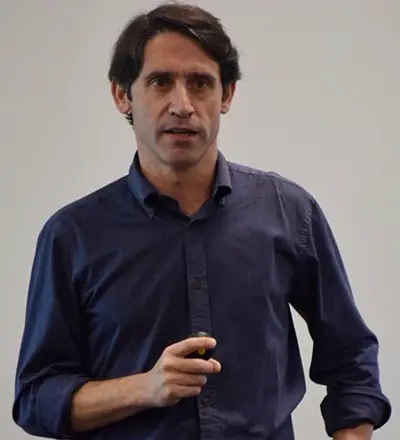
IIHA Lecturer
IDHA Lecturer
Madrid, Spain
Gonzalo Sánchez-Terán has worked for the Jesuit Refugee Service from 2001 to 2015 as Country Director in Guinea Conakry, Liberia, Côte d’Ivoire and the Central African Republic, and as Program Officer in Eastern Chad and the Somali-Ethiopian border. During this time he has organized, managed and implemented emergency projects in refugee and IDP camps with a special focus in education.
He has also done consultancy work on humanitarian assistance, development and advocacy for International NGOs in Zimbabwe, Madagascar, Zambia, Côte d’Ivoire, Kenya, Chad, Uganda, Republic of the Congo and the Democratic Republic of the Congo.
Since 2014 he is the Deputy Humanitarian Training Director at Fordham University (New York) where he also teaches at the International Diploma on Humanitarian Assistance. He is also the Director of the Education in Emergencies Course and the Strategic Issues in Humanitarian Assistance Course for the MIHA (Master on International Humanitarian Assistance).
Gonzalo is also a regular lecturer for the Humanitarian Cooperation Master at Comillas University (Madrid), NOHA Master in International Humanitarian Action at Deusto University (Bilbao), and the Master of International Cooperation in Sustainable Emergency Architecture at the UIC (Barcelona).
In the last years he has conducted training Courses for local NGOs in Sudan, Jordan, South Korea, Kenya, Myanmar, Malaysia, India, the United Arab Emirates and Nicaragua. From 2010 to 2011 he was the director of Intermon-Oxfam’s book collection.
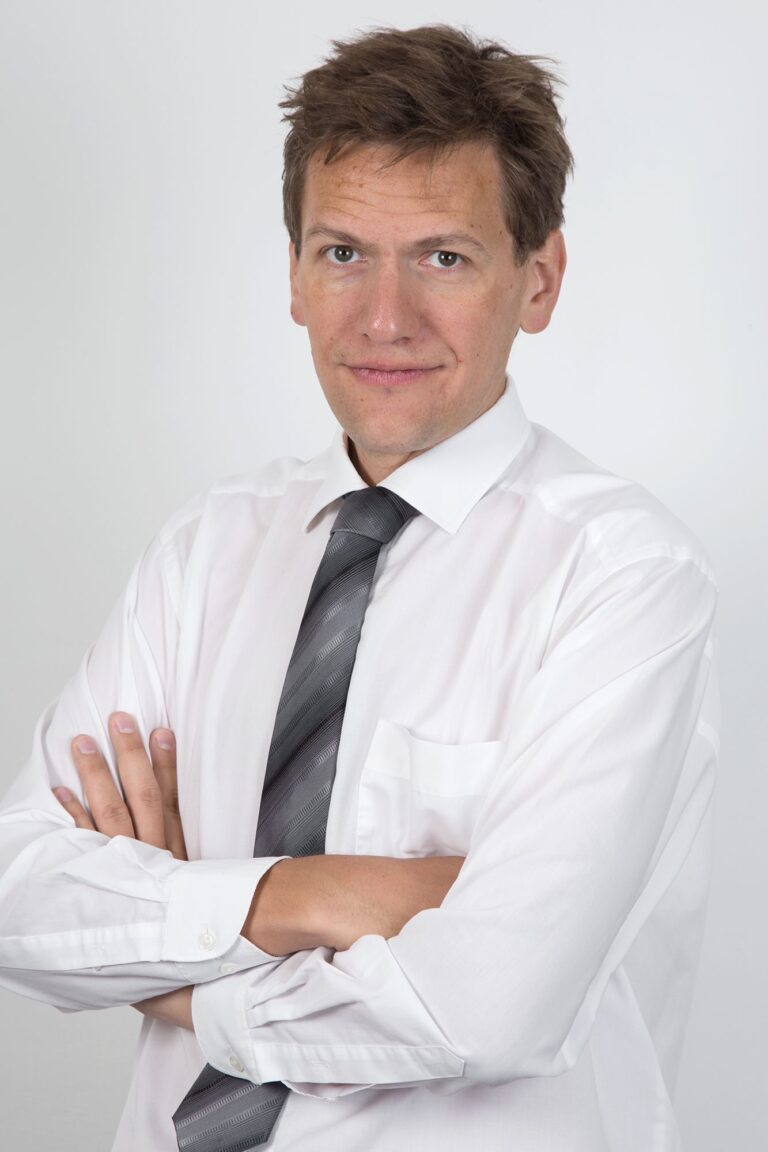
IIHA Lecturer
IDHA Lecturer
Baghdad
Florian studied law at the Universities of Vienna, Copenhagen and Innsbruck, and holds a PhD in International Criminal Law. He has worked for different international organisations including the United Nations, the OSCE, the EU and the International Criminal Court as well as for an NGO in a variety of countries including Afghanistan, Bosnia and Herzegovina, Egypt, Iraq, Kosovo, North Macedonia, Tajikistan and Ukraine. In his current position, he is working as a Senior Human Rights Officer for UNAMI’s Human Rights Office in Baghdad.
Florian Razesberger: The international Criminal Court – The Principle of Complementarity, Peter Lang Publishing Houses, 2006
2006
IDHA
In my free time I enjoy:
Hiking, diving, and mountain- biking
"I took the IDHA in 2006 in Nairobi and since 2007 have been a regular lecturer on the course, in various locations, including Istanbul, Pretoria, Kathmandu, New York, Geneva, Dublin, Berlin, Amman and Panaji."

Forced Migration Adjunct Professor
Andrew Hyslop is a humanitarian professional with over 20 years of international experience in headquarters and field operations (working in the Middle East, Afghanistan, and South-East Europe). He has worked extensively with the Security Council and is experienced in briefing Member States on humanitarian crises. In the field, he worked with refugee populations, promoted the application of humanitarian principles, and supported governance in fragile and conflict-affected contexts, including the promotion of civil and political rights for migrants. He holds a Bachelor of Science in Foreign Service from Georgetown University and a Master’s in Public Policy from Princeton.
is a practicing disaster management consultant with over thirty years’ experience advising INGOs, UN agencies, thinktanks, and governments on humanitarian coordination and disaster risk management policy and practice. A former UN official and Director of Emergencies for Care International, he was lead consultant on current IASC reference modules for Cluster and Inter-Cluster coordination. He also moderates Disasterwise.org – an online platform which explores the myths, maths and management of disaster – and presents a financial literacy podcast on behalf of CashEssentials.org.
Jim Stillwaggon retired from the practice of law in December 2023 after 50 years serving migrants, asylees, refugees and children as Counsel to the firms of White & Case LLP and Alvarez & Diaz-Silveira LLP. His public service work on behalf of asylees and unaccompanied immigrant children has been recognized by the Legal Aid Society of New York, the Chief US Immigration Judge, the Volunteers of Legal Service and Sanctuary for Families.
He is a frequent lecturer on Migration and Asylum; and has spoken before the ABA Litigation Section, the American Society for International Law and the American Immigration Law Association. He is a graduate of Villanova University (BA 1967) and St. John’s University (JD 1974}. He has been teaching in Fordham’s Humanitarian Studies Department since 2021, and has served as a lecturer at IDHA Programs for over 20 years.
Publications:
American Society of International Law. Asian Law Journal, American Bar Association- America’s Children at Risk
Academic Background:
BA Villanova University 1967; JD St. John’s University 1974
With the IIHA since:
the beginning of IDHA
Current course:
Humanitarian Studies Undergraduate Degree
In my free time I…Swim, Garden, Do outdoor activities with my grandchildren.
"Although it is currently under attack in the interest of political expediency, offering refuge to those persecuted in their home countries has a long and honored history in the United States. We forget this history at our peril."
Joshua Weber comes to Fordham University with more than 15 years’ experience implementing humanitarian response, risk reduction, and reconstruction programs in post-disaster and conflict environments. During this time, he worked integrally with governments, NGO’s, and community level stakeholders to respond, rebuild and increase resiliency to humanitarian crises. Joshua has extensive field level response experience as a shelter and emergency response expert in the US, Sri Lanka, Haiti, Nepal, Philippines, Ukraine, and Lebanon. As well as, regional level experience in Asia and the Pacific. At the IIHA, he is leading courses in humanitarian information management, monitoring & evaluation, and disaster risk reduction. Currently, Joshua supports refugee resettlement efforts in the US.
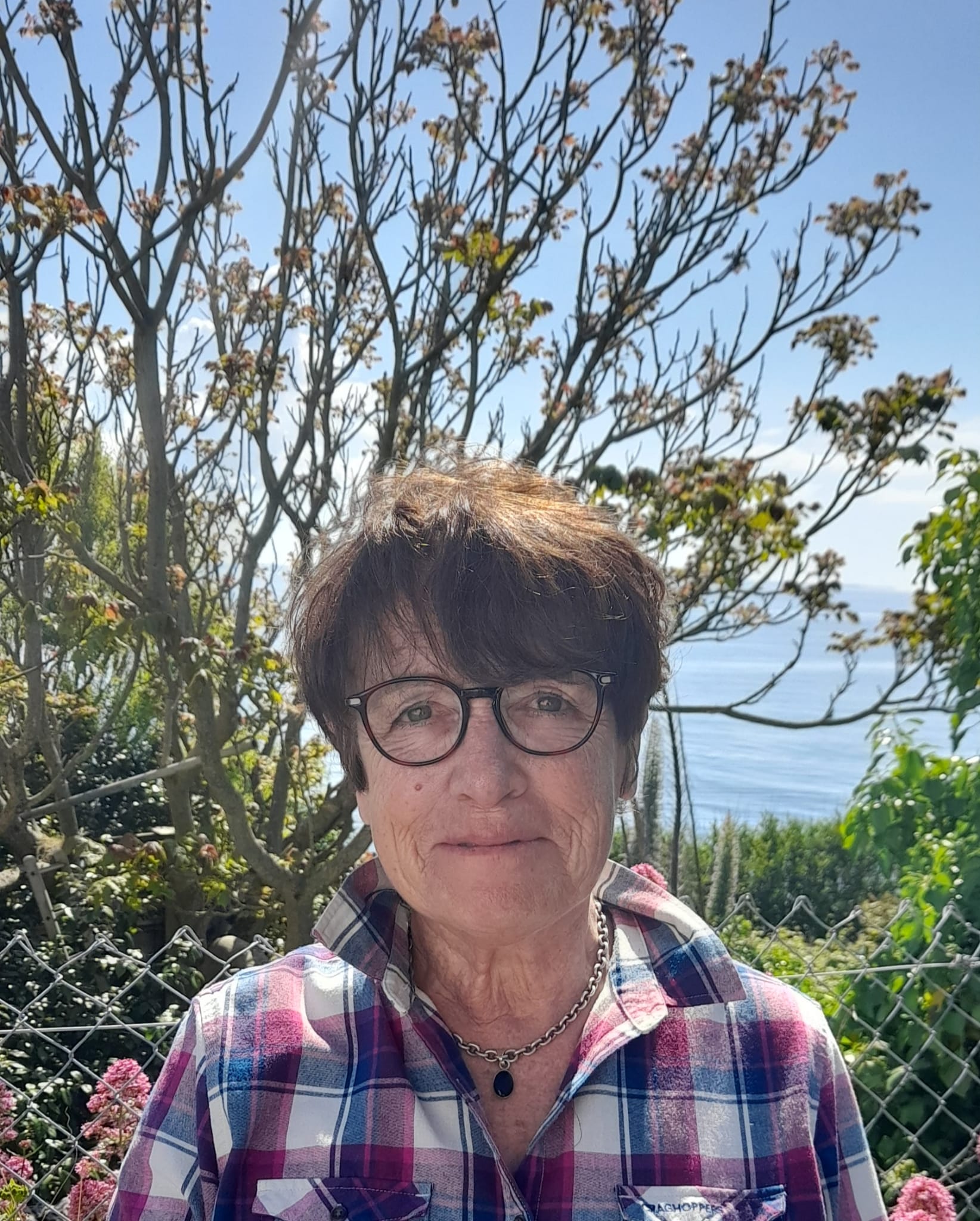
Co-founder of MHCE Course; Visiting Research Fellow; honorary associate professor London School of Hygiene and Tropical Medicine
Dr. Lynne Jones OBE FRCPsych is a child and adolescent psychiatrist, writer, relief worker
and an honorary associate professor at the London school of Hygiene and Tropical Medicine. She has been engaged in assessing mental health needs and establishing and running mental health services in disaster, conflict, and post-conflict settings around the world since 1990.
Most recently she has been developing interventions to improve maternal and child mental and physical wellbeing in adverse environments, including Peru, Ethiopia Venezuela,
Guatemala and Bosnia. Until August 2011, she was the senior technical advisor in mental health for International Medical Corps.
Lynne is a co-founder and course director for the program on Mental Health in Complex Emergencies at the International Institute for Humanitarian Affairs, Fordham University, and consults to the World Health Organization, UNICEF and UNHCR. Her most recent book is Sorry For The Inconvenience But This Is An Emergency: The Nonviolent Struggle For Our Planet’s Future (Hurst 2024). Her other books include The Migrant Diaries, (Refuge Press in 2021) about her work with migrants in Europe and Central America, Outside the Asylum: A Memoir of War, Disaster and Humanitarian Psychiatry (Wiedenfeld and Nicolson 2018), which explores her experience as a practicing psychiatrist in war and disaster zones. Then They Started Shooting: Children of the Bosnian War and the Adults They Become (Bellevue Literary Press, 2013) is a long-term exploration of the impact of war on children. She has a PhD in social psychology and political science. In 2001, she was made an Officer of the British Empire (OBE) for her mental health work in conflict-affected areas of Central Europe.
With the IIHA since: 2002
Current course: Mental Health in Complex Emergencies – An IIHA Humanitarian Short Course
In my free time: I love Birdwatching and hiking
“Teaching with the IIHA has introduced me to a global community of brilliant people who have taught me so much.”
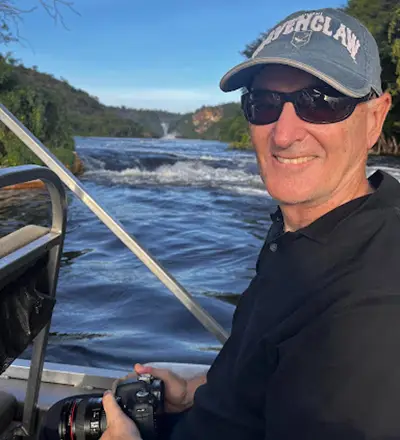
IDHA Pretoria Course Director
Cairns, Australia
Mark is an emergency physician and clinical toxicologist, with post graduate qualifications in Public Health, and Tropical Medicine. He is the editor textbooks in emergency medicine and in toxicology and has published extensively. He has research interests in disaster management, and venomous creatures, especially venomous jellyfish found in Australia.
Mark completed the IDHA in 2009 and has been both tutoring then directing IDHA courses since.
In Australia Mark is one of the senior leaders of the Australian Medical Assistance Teams (AUSMAT), a WHO verified EMT. Over a number of years, he has responded many sudden onset disasters, and during the COVID pandemic he spent months in Papua New Guinea working with national leaders supporting the country.
Marcio Gagliato, PhD, is an Independent Senior Global Humanitarian Advisor, International Lecturer, and field practitioner in Disaster Response & Recovery. With substantial experience in responding to humanitarian emergencies worldwide, he specializes in Disaster Recovery, Protection, Mental Health, and Psychosocial Support. Marcio is a Clinical Psychologist with an MA in Social Psychology and a PhD in Global Health and Sustainability from the University of São Paulo (USP).
Awarded a prestigious Human Rights fellowship by Columbia University in 2008, Marcio has worked as both a staff member and consultant with diverse global agencies such as WHO, UNICEF, IOM, and the International Committee of the Red Cross (ICRC). In 2019, he was appointed to the Extraordinary Independent Committee for Support and Reparation at Vale S.A. Corporation’s Board of Directors. Since 2021, he has served as the Course Director of Fordham’s Mental Health in Complex Emergencies course.
Among Marcio’s contributions to the humanitarian field are his roles as a leading author or key contributor of operational tools in global Mental Health and Psychosocial Support, including publications such as the IASC MHPSS Coordination Handbook and as Co-Chair of the IASC MHPSS Mapping and Assessment thematic group. Skilled in Corporate Social Responsibility, his experience has spanned over 25 countries, demonstrating his adeptness at navigating varied cultural, political, and social landscapes.
Marcio is recognized for his incisive critiques of social constructs and the underlying factors of crises, adeptly navigating the complexities of response mechanisms. His strategic insights foster fundamental changes, all while nurturing a resilient hope for profound system improvements – an approach that led to his invitation to deliver a Keynote Address at the 33rd International Congress of Psychology in Prague, Czech Republic, in 2024.
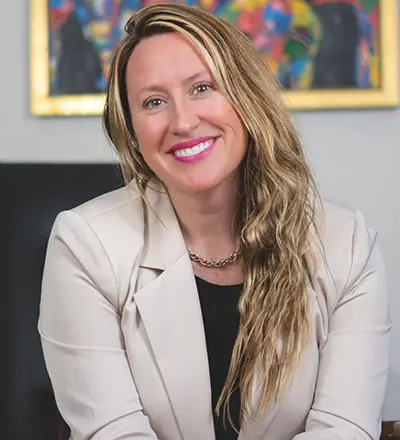
Global Health and Humanitarian
Meg is a Global Health and Humanitarian Practitioner with 15 years of experience in community-based programming and research focused on human rights, improved health, and technology innovation. For the last nine years, she has worked in digital health with a strong focus on maternal, newborn and child health, data ethics, and AI policy. She’s worked on internationally-focused projects, as well as field projects in East and West Africa, Latin America, South Asia and the Caribbean. Meg serves as Adjunct Professor at Fordham University’s Institute of International Humanitarian Affairs (IIHA).
She earned a BA Anthropology from the University of Florida and a Master of Public Health from the University of South Florida. In 2018, she received an International Diploma in Humanitarian Assistance from IIHA. She intentionally seeks work and experiences that generate human benefit.
Publications
Finette, B.A., McLaughlin, M., Scarpino, S.V., Canning, J., Grunauer, M., Teran, E., Bahamonde, M., Quizhpe, E., Shah, R., Swedberg, E., Rahman, K.A., Khondker, H., Chakma, I., Muhoza, D., Seck, A., Kabore, A., Nibitanga, S., & Heath, B. (2019). Development and initial validation of a frontline health worker mHealth assessment platform (MEDSINC®) for Children 2-60 months of age. The American Journal of Tropical Medicine and Hygiene, 100(6), 1556-1565. https://doi.org/10.4269/ajtmh.18-0869.
2.McLaughlin, M., Pellé, K.G., Scarpino, S.V., Giwa, A., Mount-Finette, E., Haidar, N., Adamu, F., Adeyoju, T., Ravi, N., Thompson, A., Heath, B., Dittrich, S., & Finette, B. (2020). Development and validation of manually modified and supervised machine learning (ML) clinical assessment algorithms for malaria in Nigerian children. Frontiers in Artificial Intelligence. https://doi.org/10.3389/frai.2021.554017
3.M. Shah, E. Sang, A. Afeworki, M. McLaughlin, B. Finette, L. Kwamboka, D. Ogaro (2022). mHealth platform improved health worker’s compliance to WHO’s IMNCI guideline in Nairobi, Kenya: Elsie Sang European Journal of Public Health, Volume 32, Issue Supplement_3, October 2022, ckac129.423, https://doi.org/10.1093/eurpub/ckac129.423 Published: 25 October 2022
4.Pending publication: Frade, Sasha, et. Al. (2023) Malaria RDT (mRDT) interpretation accuracy by frontline health workers compared to AI and Panel Read in Kano State, Nigeria
5.Pending publication: McLaughlin, M., Metiboba, L., Giwa A., Mount-Finette, E., Ravi, N., Abbas, D., Finette, B. Increasing adherence to Integrated Management of Childhood Illness (IMCI) guidelines by community health workers in Kano State, Nigeria through use of THINKMD digital mHealth platform
Academic Background: International Diploma in Humanitarian Assistance, Fordham; Master of Public Health, Global Health Practice, Maternal and Child Health, University of South Florida; B.A. Anthropology/Pre-Medicine, Chemistry, University of Florida
With the IIHA since: 2020
Current courses: Humanitarian Studies Undergraduate Degree and Community and Public Health
In my free time I…Travel and learn about other cultures. I enjoy hiking, paddling, mountain biking with my dogs, learning, and reading
“My career has been focused on projects and programs that prioritize community engagement and human rights. As a Global Health Practitioner, I have a strong lens for health and see health as the foundation for all other things relating to human life, including education, productivity, and peace. This perspective translates into my courses at IIHA, as I support students in realizing how their own passions connect to transdisciplinary careers like humanitarian affairs. It is all connected."
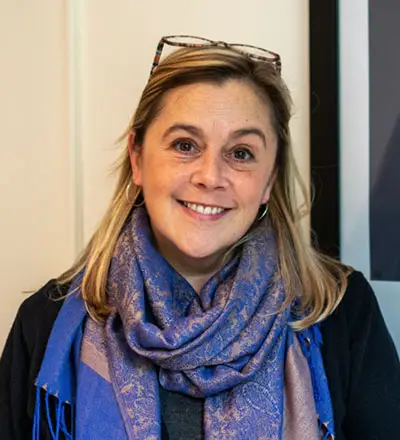
Political Science Professor at Fordham
Melissa Labonte, Associate Professor of Political Science, is an award-winning researcher and teacher, specializing in humanitarian access and civilian protection, peacebuilding, multilateral peace operations, conflict resolution, human rights, and West African politics. Her current research focuses on conflict-driven hunger and famine, and impediments to UN Security Council action and accountability when food is used as a weapon of war against civilian populations. She has published three books on human rights, humanitarian intervention, and the Responsibility to Protect, and her research has appeared in leading international relations and area studies journals, including African Affairs, Global Governance, Third World Quarterly, International Studies Perspectives, and International Journal of Human Rights. Professor Labonte is a faculty affiliate with Fordham’s Institute of International Humanitarian Affairs, and Advisory Board Member of Columbia University Press’ International Affairs Online (CIAO). She has taught in a number of IDHA courses, including in New York, Rome, and Nairobi.
A former sub-Saharan Africa Advisor to Freedom House and steering committee member for She4SG, she has also held numerous elected and appointed leadership positions within the International Studies Association and the Academic Council on the United Nations System. Between 2016—2020 she served as Interim Dean and Associate Dean in Fordham’s Graduate School of Arts and Sciences, leading initiatives resulting in significant growth in enrollment, the development of innovative new graduate programs, and the near doubling of development resources and support for graduate students. Professor Labonte is currently serving as Co-Chair of the Steering Committee overseeing the University’s Middle States accreditation and self-study process.
Publications
Books/Edited Volumes
Accessing and Implementing Human Rights and Justice (Kurt Mills and Melissa Labonte, eds.), (London: Routledge, 2019)
Human Rights and Justice: Philosophical, Economic, and Social Perspectives (Melissa Labonte and Kurt Mills, eds.),
(London: Routledge, 2018)
Human Rights and Humanitarian Norms, Strategic Framing, and Intervention: Lessons for the Responsibility to Protect(London: Routledge, 2013)
International Organization Section Component of the International Studies Encyclopedia, a reader of original, peer-reviewed essays on select dimensions of international organization (London: Wiley-Blackwell, April 2010) [Co-editorwith Kendall W. Stiles, Brigham Young University]Journal Articles/Peer-Reviewed Work
“Women, Peace, and Security: Are We There Yet?,” (co-authored with Gaynel Curry), Global Governance: A Review of
Multilateralism and International Organizations Vol. 22 no. 3 (July-September 2016): 311-319
“Men and Women for Others: Collaborative Learning and Innovative Assessment in Humanitarian Studies,” (co-authored with Stephanie L. Burrell Storms, Ana Marie N. Siscar, and Susan F. Martin) International Studies Perspectives Vol. 16 (May 2015): 107-126
“Challenges in Humanitarian Information Management and Exchange: Evidence from the Haiti Response,” (co-authored with Nezih Altay, DePaul University), Disasters Vol. 38(1) (April 2014): S50-S72
“Towards a Typology of Humanitarian Access Denial,” (co-authored with Anne C. Edgerton), Third World Quarterly Vol. 34(1) (February 2013): 39-57
“Whose Responsibility to Protect? The Implications of Double Manifest Failure for Civilian Protection,” International Journal of Human Rights Vol. 16(7) (2012): 982-1002
“From Patronage to Peacebuilding? Elite Capture and Governance from Below in Sierra Leone,” African Affairs Vol. 111,
no. 442 (2012): 90-115
“Human Rights and Peacebuilding,” in David P. Forsythe, ed., Encyclopedia of Human Rights, (Oxford: Oxford University Press, 2009)
“Same Car, Different Driver? The Impact of Peacebuilding “Partnerships” and the Chiefdom System in Sierra
Leone,” Journal of Peacebuilding and Development Vol. 4, no. 1 (2008): 67-81
“Dimensions of Post-Conflict Peacebuilding and Democratization,” Global Governance: A Review of Multilateralism and International Organizations Vol. 9, no. 2 (2003): 261-272
Book Chapters
“Introduction,” Human Rights and Justice: Philosophical, Economic, and Social Perspectives (Melissa Labonte and Kurt
Mills, eds.), (London: Routledge, 2018)
“Introduction,” Accessing and Implementing Human Rights and Justice (Kurt Mills and Melissa Labonte, eds.), (London:
Routledge, 2018)
“R2P’s Status as a Norm,” in Alex J. Bellamy and Tim Dunne, eds., The Oxford Handbook on the Responsibility to Protect
(London: Oxford University Press, 2016)
“The Evolution of Rights-Based Humanitarianism in Sierra Leone,” [co-authored with Ishmeal Alfred Charles, Caritas-
Freetown] in The History of Humanitarianism: Africa (London: Overseas Development Institute, 2016)
“Grappling with Double Manifest Failure: R2P and the Civilian Protection Conundrum,” in Kurt Mills and David Karp, eds.,
Protecting Human Rights: Duties and Responsibilities of State and Nonstate Actors (London: Palgrave-Macmillan, 2015)
“Humanitarian Logistics and the Cluster Approach: Global Shifts and the U.S. Perspective,” updated and revised for 2
Nd edition, Martin Christopher and Peter Tatham, eds., Humanitarian Logistics: Meeting the Challenge of Preparing and Responding to Disasters (London: Kogan Page Publishers, 2014) [co-authored with Nezih Altay, DePaul University]
“Humanitarian Logistics and the Cluster Approach: Global Shifts and the U.S. Perspective,” in Martin Christopher and Peter Tatham, eds. (1st edition), Humanitarian Logistics: Meeting the Challenge of Preparing and Responding to Disasters (London: Kogan Page Publishers, 2011) [co-authored with Nezih Altay, DePaul University]
“International Organization,” in Robert Denemark and Andrea Gerlak, eds., International Studies Encyclopedia (London: Wiley-Blackwell, 2010) [co-authored with Kendall W. Stiles, Brigham Young University]
“Jus Post Bellum, Peacebuilding, and Non-state Actors: Lessons from Afghanistan,” in Eric A. Heinze and Brent J. Steele, eds.,
Ethics, Authority, and War: Non-State Actors and the Just War Tradition (New York: Palgrave-Macmillan, 2009)
“Sierra Leone,” pp. 141-227 in William Durch, ed., Twenty-first Century Peace Operations (Washington, DC: U.S. Institute of
Peace Press, 2006) [co-authored with Eric G. Berman, Small Arms Survey Geneva]
“Humanitarian Actors and the Politics of Preventive Action: Is There Room in the Peace-Building Framework?”, in W. Andy
Knight and Tom Keating, eds., Building Sustainable Peace (Edmonton: University of Alberta Press and United Nations University Press, 2004)
Reviews Sharing Responsibility: The History and Future of Protection from Atrocities, by Luke Glanville, Ethics & International Affairs, Vol. 36(2) Summer 2022: 275-278.
Religion, Tradition, and Restorative Justice in Sierra Leone, by Lyn S. Graybill, Journal of Church & State, Vol. 61(2) Spring 2019: 326-328.
“Vexing Questions about Interventionism and Norm Diffusion,” a review of Myth of the Democratic Peacekeeper: Civil- Military Relations and the United Nations, by Arturo Sotomayor and All Necessary Measures: The United Nations and Humanitarian Intervention, by Carrie Booth Walling, Peace Review Vol. 27(3) September 2015: 402-405
Empire of Humanity: A History of Humanitarianism, by Michael Barnett, in Political Science Quarterly Vol. 127(2) Summer 2012: 344-345
Dead Aid: Why Aid is Not Working and How There is a Better Way for Africa, by Dambisa Moyo, in Journal of North African Studies Vol. 15(1) March 2010: 127-129
Complex Political Victims, by Erica Bouris, in H-Human-Rights Book Reviews (October 2007) available on-line at http://www.h-net.org/~hrights/
Human Security and the UN: A Critical History, by S. Neil MacFarlane and Yuen Foong Khong, in International Affairs, Vol. 83, no. 5 (September 2007): 980-981
Blood on the Doorstep: The Politics of Preventive Action, by Barnett Rubin, in the International Journal of African Historical Studies Vol. 36, no. 2 (Winter 2003): 479-481
“Rethinking Intervention,” a review of Civil Wars and Foreign Powers: Outside Intervention in Intrastate Conflict, by Patrick Regan and Why Peacekeeping Fails, by Dennis Jett, International Studies Review Vol. 3, no. 1 (2001): 182-185
Policy-Focused Research
Implementing Resolution 2417: Overcoming Challenges to UN Security Council Action to Mitigate Conflict-Induced Food Insecurity and Hunger (with Brendan Cahill and Anjali Dayal), White Paper prepared for the Permanent Mission of Ireland to the United Nations, March 2022
SCHOLARSHIP IN PROGRESS
Inter Arma, Caritas: Contemporary Humanitarian Studies and Action (co-authored with Brendan Cahill, Fordham University), textbook under contract with University of Toronto Press Unfinished Business? Multilateralism, Hybridity, and Building the Peace in Sierra Leone (book manuscript prospectus)
“Assessing the Peacebuilding Implications of Biometric
Academic Background
Ph.D., Political Science, Brown University, Providence, Rhode Island, 2005,
A.M., Political Science, Brown University, Providence, Rhode Island, 1999,
A.B., International Relations, Syracuse University, Syracuse, New York, 1988
With the IIHA since: 2008
Current courses
HUST 5200 Protecting Vulnerable Populations, POSC 3534 International Politics of Civilian Protection, POSC 3508 Politics of Humanitarianism in Africa, POSC 3516 Conflict Resolution and Analysis, POSC 4515 International Politics of Peace, POSC 3527 UN Peace Operations
“My courses include theory and empirical cases, and grounded approaches to the study of humanitarian politics, the study of peacekeeping, peacemaking, and peacebuilding, and the contemporary global politics of humanitarianism and human rights.”
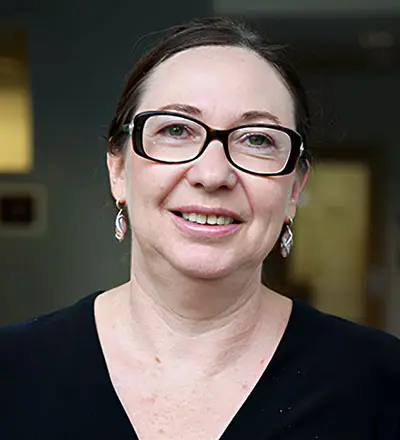
Evolution and Development of Humanitarian Systems
Monitoring and Evaluation of Humanitarian Response
Humanitarian Resource and Management
Glastonbury, CT/Bronx, NY
Pierrette Quintiliani has been working in the field of humanitarian affairs since 1989.Throughout her career, she has collaborated with various organizations, including theSwiss government, the International Committee of the Red Cross, Save the Children,the World Bank, and Oxfam America. Her advocacy and relief work have taken her to liveand work in different parts of the world, such as the Great Lakes region and Sub–Saharan Africa, as well as in the Caucasus and South-East Asia.Ms.
Quintiliani holds a master’s degree in International Affairs from Johns Hopkins University anda Ph.D. in Sociology from Bradford University (UK). As a scholar, her research interestsrevolve around studying relationships and partnerships between humanitarianorganizations, traditional and non-governmental organizations, and local governmentalorganizations. For the past fifteen years, she has been teaching about conflicts andhumanitarian assistance at Brandeis University. She is also an advisor to students inthe Coexistence and Conflict department of the Heller School for Management andSocial Policy. Ms. Quintiliani has been teaching at the Institute of InternationalHumanitarian Affairs since 2019.
"An open mind and curiosity are essential to complete these courses which are technical and conceptual. Understanding the concept and applying them to case studies is a rewarding experience."
Pierrette Quinitiliani
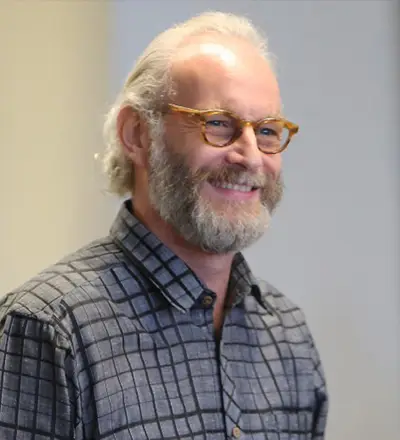
Chair of Alumni Council
IDHA Lecturer
New York
Piwi has worked for the Red Cross and Red Crescent Movement for over 30 years. His assignments focussed on humanitarian and development programming and coordination in various operational and managerial positions.
He worked in 16 country offices in Asia and Africa, the regional offices in East and Central Africa, Asia Pacific and at the IFRC Secretariat in Geneva. Since May 2020, Piwi serves as IFRC Head of the Pakistan Country Delegation based in Islamabad.
Piwi is a faculty member of the Institute of International Humanitarian Affairs (IIHA) in New York. Himself an alumnus of the IDHA 24, is currently serving as Chairperson of the Alumni Council of the Centre for International Humanitarian Cooperation. He holds a Master of Arts in International Humanitarian Action through the IIHA/Fordham University in New York.
Peter Ventevogel, M.D., Ph.D., is a psychiatrist and a medical anthropologist with over 22 years of experience in humanitarian and development programming for NGOs and UN around mental health and psychosocial support (MHPSS) for populations affected by violence and displacement. Since 2013, he serves as Senior Mental Health and Psychosocial Support (MHPSS) Specialist with UNHCR, the refugee agency of the United Nations in Geneva. In this role he supports country operations of UNHCR with technical guidance around mental health and psychosocial support for refugees and other forcibly displaced populations.
He has done more than 75 field missions to 35 countries and has been a key contributor to clinical tools in global mental health including the mhGAP Intervention Guide (WHO 2010) and the mhGAP Humanitarian Intervention Guide (WHO & UNHCR, 2015). He has been involved in various operational research projects around mental health among refugees and conflict-affect populations settings and published 100+ peer-reviewed articles, book chapters etc.
To read more on UNHCRs work on MHPSS see https://www.unhcr.org/mental-health-and-psychosocial-support
Christopher Harland is the ICRC’s Deputy Permanent Observer and Head of Humanitarian Affairs at the ICRC’s Delegation to the United Nations in New York. He held ICRC legal positions in the Regional Delegation for the United States and Canada, based in Washington, D.C. (2014-2018), in Kuala Lumpur for Southeast Asia (2012-2014), New Delhi for South Asia (2007-2012) and the Legal Division of the ICRC at its Headquarters in Geneva from 2004 to 2007.
A Canadian lawyer, Chris previously held positions with the United Nations in the Cyprus Referendum (2004), was a member of the High Judicial and Prosecutorial Councils of Bosnia and Herzegovina (2002-2004), at the Human Rights and Rule of Law Department of OHR in Bosnia, and worked with the UN in Africa from 1996 to 1998. He has also worked in the Office of the Legal Counsel at UN Headquarters as an intern (1995) and clerked with a judge of the Federal Court of Canada (1993-1994).
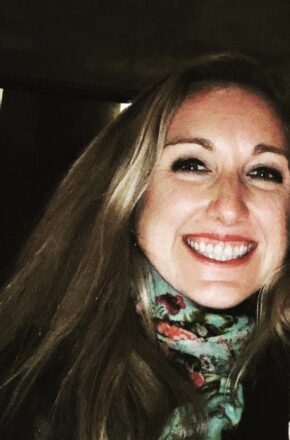
MHCE Adjunct Professor
Senior Global Mental Health & Psychosocial Support Advisor International Medical Corps
Claire Whitney, MIA, LICSW, is a licensed clinical social worker and humanitarian worker
specialized in the assessment of and response to the mental health and psychosocial
impacts of war, conflict, human rights abuses, forced displacement, and the refugee
experience in challenging humanitarian contexts.
Ms. Whitney serves as International Medical Corps’ Senior Global Mental Health and Psychosocial Support Advisor. She has extensive experience in the development and implementation of mental health and psychosocial support services with diverse and vulnerable populations in ongoing emergency and post-conflict contexts. She has been
working in the humanitarian field to support MHPSS initiatives across the globe for nearly 20 years, including in Iraq, Syria, Jordan, Lebanon, Gaza, Yemen, Turkey, Greece, Central African Republic, Cameroon, Nepal, and Haiti. In her leadership role, she provides technical support and programmatic guidance for IMC teams implementing a variety of humanitarian MHPSS initiatives. She also represents IMC at the global interagency level, engaging in ongoing coordination, normative work and development of technical products, as well as advocacy efforts.
Ms. Whitney obtained Masters degrees from Columbia University, including an MSW at the School of Social Work (with a concentration in advanced clinical social work) and an MIA at the School of International and Public Affairs (with a concentration in international humanitarian affairs). She received her BA (with honors) in Psychology at New York University. She received the Presidential Award for her work in the international mental health field by the American Psychological Association (2016).
To learn more about IMC’s global MHPSS work, read here.
Whitney Fry, DrPH, MPH, is a global health and gender equality specialist dedicated to fostering positive systems change in complex environments. She applies evidence-based, strengths-focused approaches to advance collective health and peaceful collaboration worldwide. Motivated by curiosity and a deep commitment to human dignity, Whitney focuses on understanding and co-developing systems that promote equality and health, particularly for marginalized populations. Her technical expertise spans gender-based violence, sexual and reproductive health, menstrual health and hygiene, mental health and psychosocial support, and gender equality and social inclusion.
In addition to her Adjunct Faculty role at Fordham University’s Institute of International Humanitarian Affairs, Whitney is the Founder and Director of Flame Tree Global, a research, training, and facilitation hub that sparks curiosity, fosters learning, and encourages meaningful dialogue. She is also a Senior Associate at Iris Group, a consulting firm specializing in gender equality and social inclusion, where she helps organizations and communities positively transform social norms. Further, Whitney is Adjunct Assistant Professor at the University of North Carolina’s Gillings School of Global Public Health in Chapel Hill, NC.
Countries of professional engagement include Kenya, Uganda, Ethiopia, Somalia, Tanzania, Sudan, South Sudan, Egypt, Jordan, Afghanistan, Indonesia, Fiji, and the United States. Whitney holds a DrPH in Health Policy and Management from the University of North Carolina at Chapel Hill (2016), an MPH in International Health and Complex Emergencies from Tulane University (2006), and a BA in Biology from Taylor University (2003).
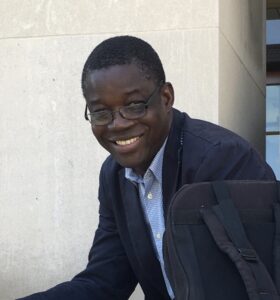
Associate Professor
Martino Hall, 426
Manhattan, NY
Professor Isaie Dougnon is an associate professor of Francophone Humanitarian Studies at Fordham University. He teaches a variety of undergraduate and master’s level courses that combine his expertise in African culture, politics, society and the environment. An anthropologist by trade, Dougnon has been surveying the humanitarian effects of climate change, such as how natural resources get depleted and how that impacts internal migration, for more than 25 years.
Alberto Preato is a program manager at the UN Migration Agency (IOM) in Niger and a Visiting Humanitarian Research Scholar at the Institute of International Humanitarian Affairs. He received a Master Degree in Sustainable Emergency Architecture at the Universidad Internacional de Catalunya in Barcelona and holds a Master in Sustainable Architecture at the Università Iuav di Venezia (Venice, Italy).
Alberto Preato has been on the frontline of some of the most challenging humanitarian responses to natural disaster and complex crisis and has been deployed as shelter and settlement experts in Mozambique, Colombia, Haiti, Honduras, Vanuatu, Fiji and Niger. At the IIHA Alberto will work with partners from all over the world to find innovative design solution to better respond to the needs and uphold the rights of displaced populations in emergencies and protracted crisis.
Dr. Asmamaw Sisay Yigeremu MD, MAHA, MSc, is a General Practitioner with more than 30 years of experience working as a clinician, manager and trainer with rural and indigenous communities in low resource environments including Ethiopia, Haiti, Mozambique and Belize. He has expertise in establishing emergency and primary health care services from scratch in a variety of settings serving conflict and disaster affected, displaced and refugee populations. For the last five years, in collaboration with Dr. Lynne Jones, he has been developing interventions to improve maternal and child mental and physical wellbeing in adverse environments, including Peru, Ethiopia, Venezuela, Guatemala and Bosnia. For the last 6 years, when in the UK he is a volunteer case worker with Doctors of The World UK helping migrants and vulnerable people with different needs. In addition to his medical degree from Havana Medical school in Cuba he has an MA in Humanitarian Assistance, (Tuft’s University, USA) and an MSc in Environment and Human Health (Exeter University, UK).
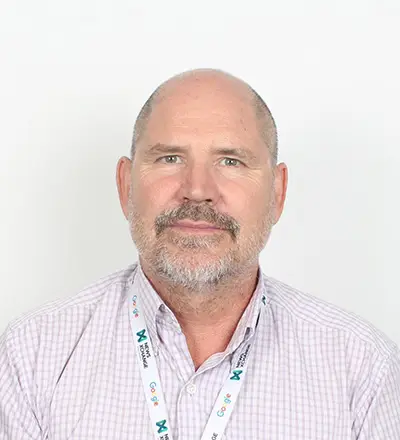
Visiting Research Fellow
The Graphix Project
New York City
Christian Clark is a Visiting Research Fellow at Fordham’s Institute of International Humanitarian Affairs (IIHA) and former Chief of Public Advocacy and Campaigns at UN OCHA. Christian heads The Graphix Project, which seeks to allow human rights and social activists, high school students, and other youth demographics globally to connect, plan and learn from each other.
Christian Clark is a cartoonist (Washington Post, Financial Times, Toronto Star, Guardian, etc.) and two-time Emmy Award-winning writer (Sesame Street) who has written and/or illustrated three graphic histories including the 2017 UNtold: The Real Story of the United Nations in Peace and War. Christian has extensive international advocacy and human rights experience working for the BBC and the United Nations in North America, Asia, Africa and the Balkans. He led the Meena project for some years, a groundbreaking UNICEF effort to advance girls’ rights using animation for social change in Asia.
He is the founder of the Graphix Project (GP) which will serve as a cartoon-based human rights support initiative. The GP will allow human rights and social activists, high school students and others — from #BLM in the U.S. to the climate justice campaign globally — to connect with, plan and learn from each other and experts through the project’s interactive online platform. The project will promote active change by using a range of mediums and products including activist toolkits, grade appropriate curriculum, graphic histories and novels, comics, animation and podcasts. The project concept has been tested through Masters level course work at both CUNY (2019) and Columbia University (2020), as well as through a multilingual (English, French and Spanish) online survey, developed with Amnesty International, shared with 200 human rights entities worldwide. The results will be fed into a Yale-supported global focus group initiative to answer a central question: “Are cartoons/graphics seen as a serious and appropriate medium for engaging activists across cultures?”
Publications:
Cartoonist (Washington Post, Financial Times, Toronto Star, Guardian, etc.) and two-time Emmy Award-winning writer (Sesame Street) who has written and/or illustrated three graphic histories.
Academic Background: BA Political Science McGill University, MA Media Studies New School
With the IIHA since: 2023
Sir Charles Petrie Bt, OBE has had close to 30 years’ experience working in contexts of
conflict and famine, some of it with Médecins Sans Frontières (Mali and areas under the
control of the Eritrean People’s Liberation Front) and much of it with the UN system
(Sudan, Somalia, Rwanda (during the 1994 Genocide), the Middle East, Democratic
Republic of the Congo, and Afghanistan). From mid 2003 to end 2007 he was the UN
Resident and Humanitarian Coordinator, UNDP Resident Representative for Myanmar.
After being asked to leave Myanmar for supporting the monks of the Saffron Revolution,
he became the UN Deputy Special Representative of the Secretary General for Somalia.
A position he held until early 2010. Charles Petrie resigned from the UN at the end of
2010 at the level of Assistant Secretary General as the Executive Representative of the
Secretary General for Burundi.
After leaving the UN, Charles Petrie was, from March 2011 to September 2012, the
special policy advisor to the President of Somalia based in Villa Somalia Mogadishu.
From February 2012 to March 2015, upon the Myanmar government’s invitation, Charles
Petrie coordinated the Norwegian Government sponsored Myanmar Peace Support
Initiative. A mechanism set up to facilitate the discussions between the Government and
the Ethnic Armed Groups. In March 2012, Charles Petrie was designated by the UN
Secretary General to lead an internal review of the UN’s actions in Sri Lanka during the
last phase of the conflict. The report was submitted to the Secretary General in early
November of that year and served as the basis for the elaboration of the Secretary
General’s ‘Rights up Front’ policy – a policy that places protection at the forefront of all
UN action.
In the first half of 2015, Charles Petrie was designated as one of seven experts
commissioned by the UN Secretary General to review the UN's peace building efforts.
The report they produced contributed to the formulation of the joint UN General
Assembly (262) and UN Security Council Resolutions (2282) on ‘Sustaining Peace’. In
the latter part of 2016, he was invited to lead an assessment of the UN’s integrated
strategy for the Sahel. The recommendations of the report, submitted to the UN Security
Council in January 2017, formed the basis of the Presidential Statement on the Sahel.
Finally, as concerns the United Nations, Charles Petrie is providing mentoring support to
a number of newly appointed UN Resident Coordinators.
In addition to work he continues to undertake for the UN, Charles Petrie has also been
invited to provide policy guidance to various governments. From 2018-2019, he was advisor
to the Syrian opposition. Funded by the German Government, he was tasked with helping
the opposition redefine its legitimacy following the losses in areas of control within Syria.
Since February 2021, Charles Petrie has been providing support to Myanmar civil society’s
opposition to the military. In this capacity he has been able to get a better sense of the limits
of traditional humanitarian aid in reaching those most affected. Coming out of these
observations has been the belief that a new model of international engagement needs to be
found and developed that is able to support the emergence of local governance structures
( https://www.devex.com/news/opinion-a-new-aid-model-can-better-assist-communities-
in-pariah-states-105617 ). In January-February 2024, Charles Petrie crossed in Myanmar
to get a better understanding of the governance structures in areas no longer under the
control of the Myanmar military (https://www.noemamag.com/a-journey-into-rebel-held-
myanmar/).
In August 2021, Charles Petrie published a book entitled The Triumph of Evil, which relates
the story of an attempt to get a former UN official to account for his alleged involvement in
the murder of thirty-two people, including UN colleagues. He is currently working on a
second book with the working title of Lyrics for Unsung Heroes. The book will honour
ordinary individuals whom he met over the years – individuals who have demonstrated
incredible courage and nobility.
Charles Petrie was named Officer of the Order of the British Empire (OBE) in the 2014
New Year’s Honours list for services to international peace, security and human rights.
Upon his request, he received the award in Mogadishu. Following the death of his father
in October 2021, he became the sixth Baronet of Carrowcarden.
” In my free time I enjoy writing, long off-road motorcycle journeys, and being challenged by the younger generation.”
Visiting Research Fellow
Trinidad and Tobago
….